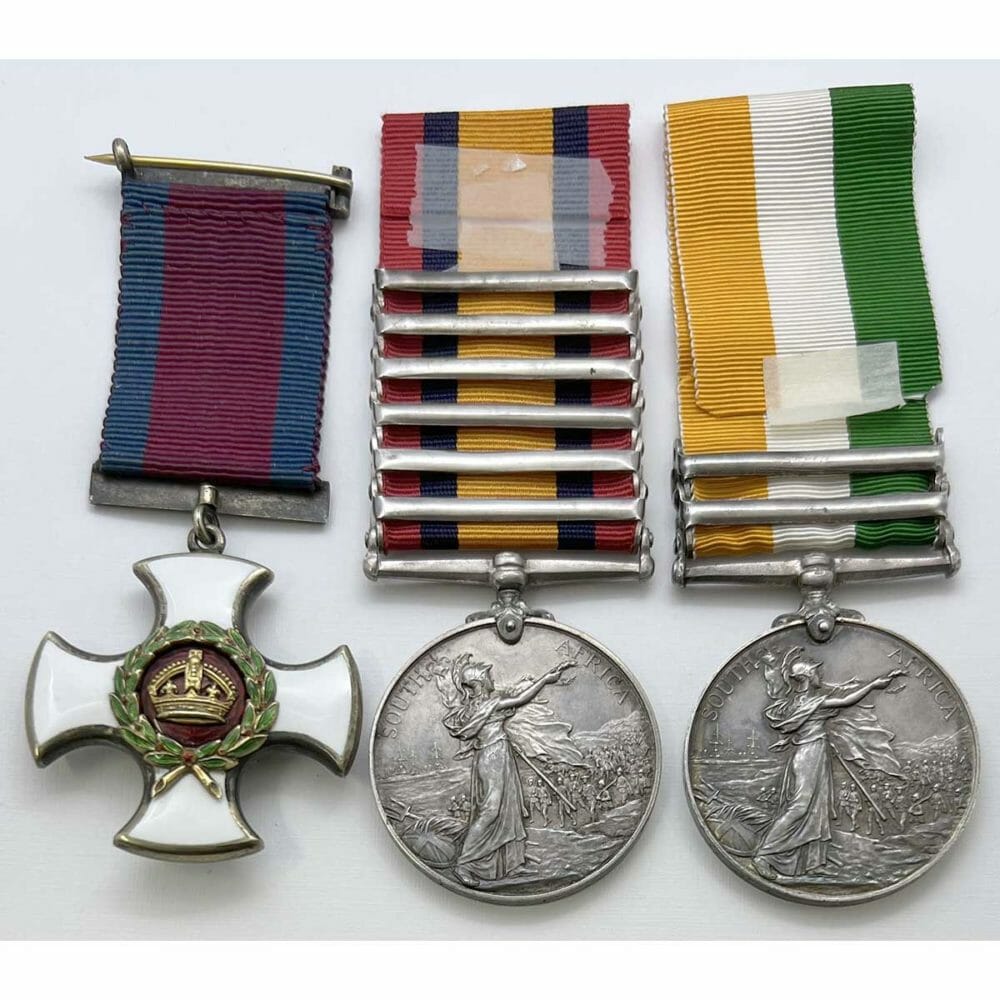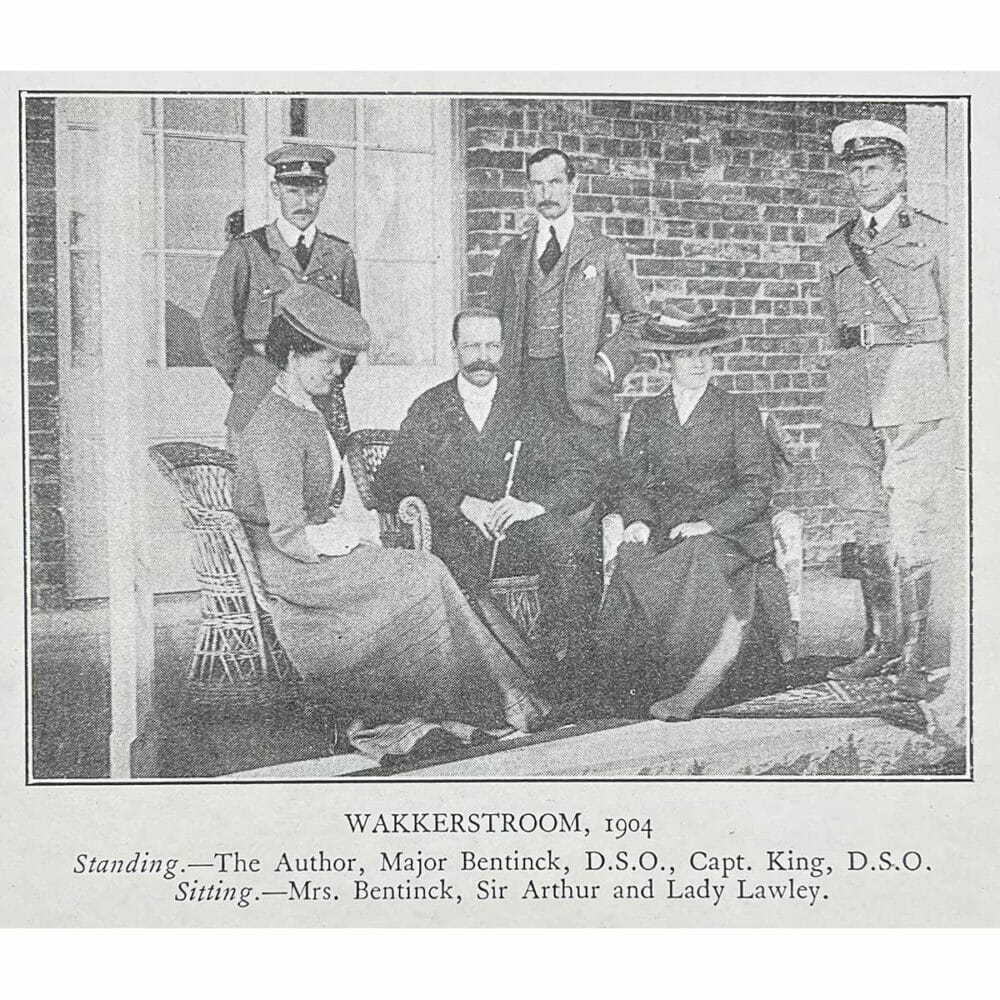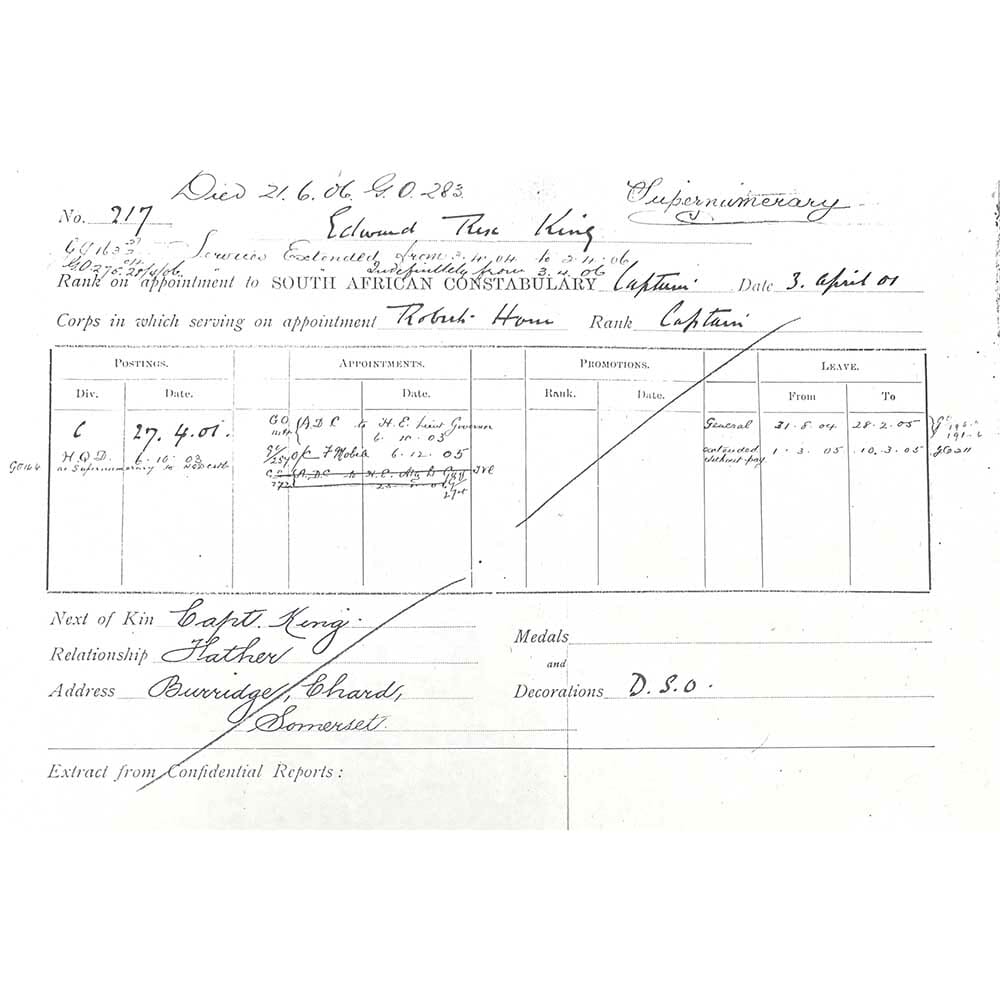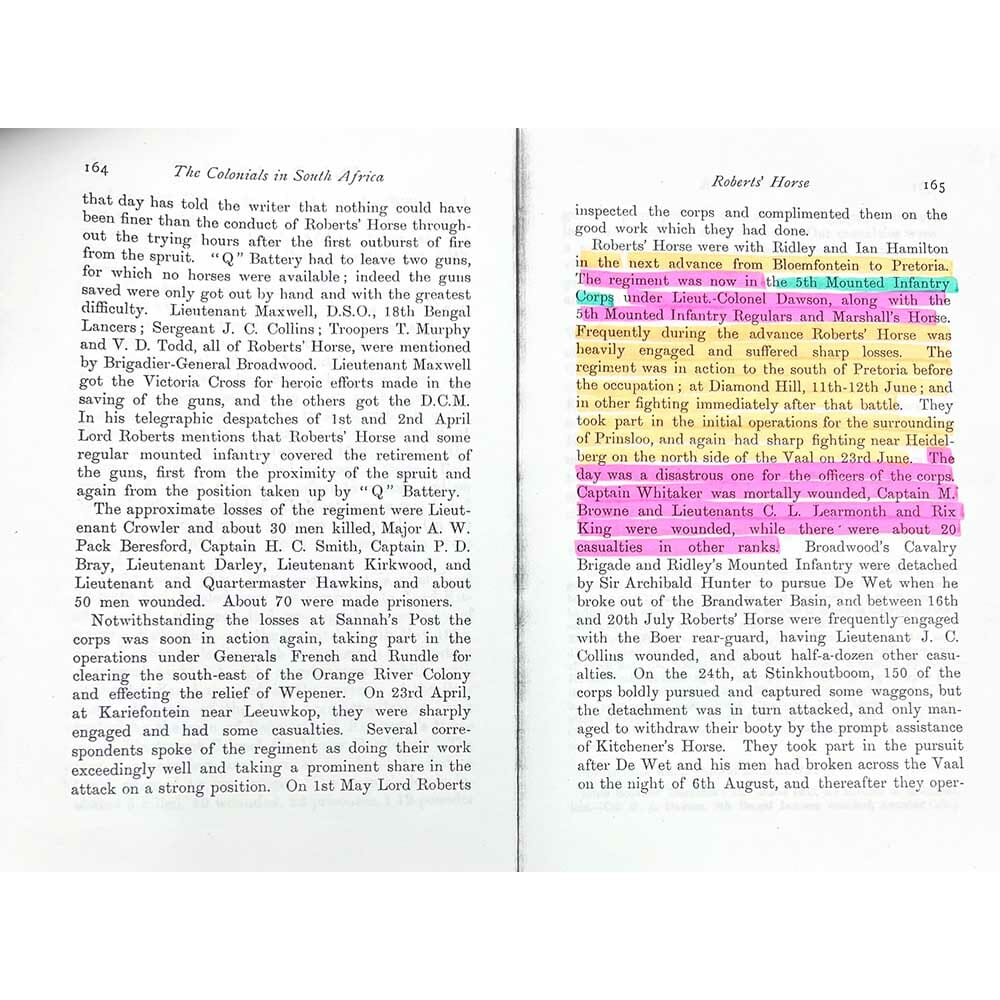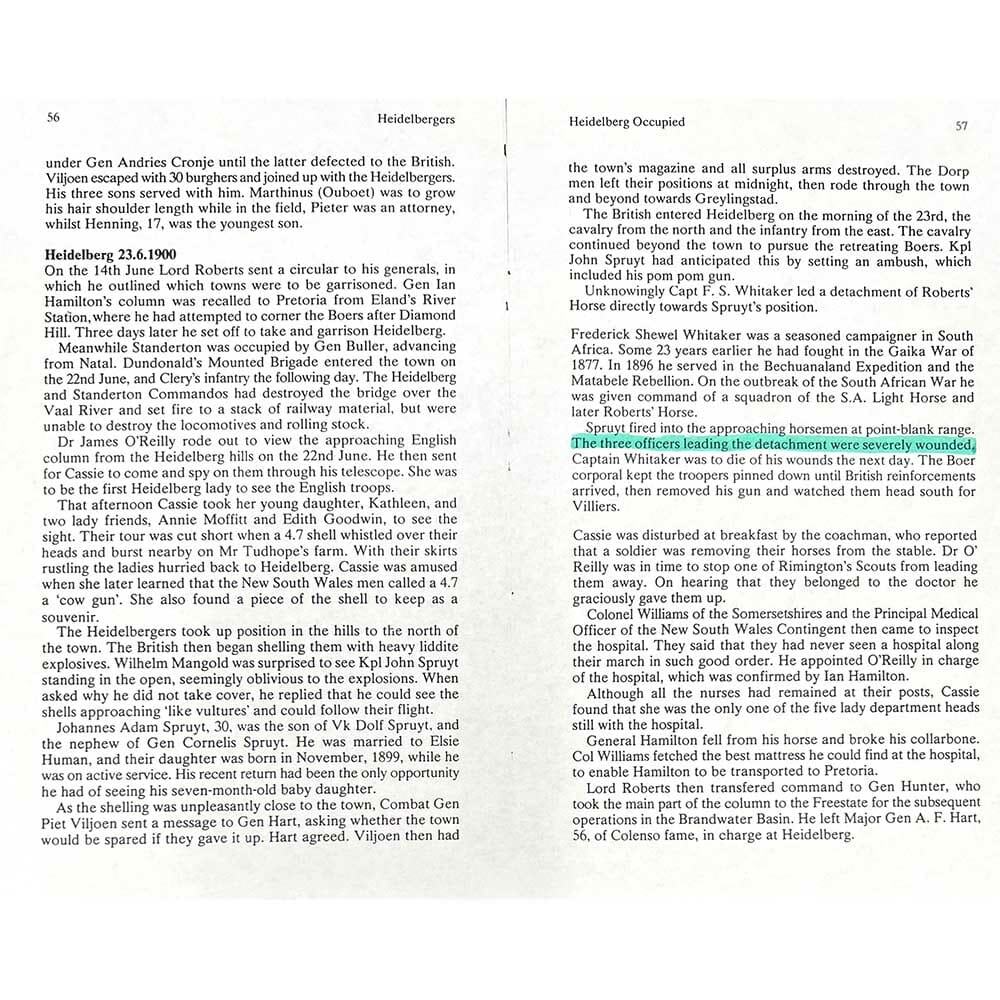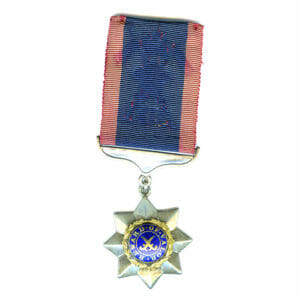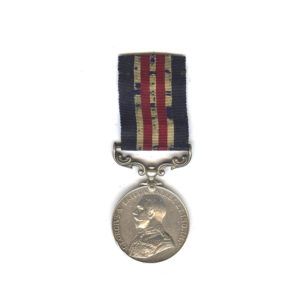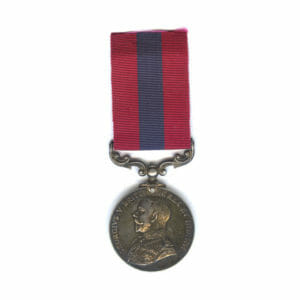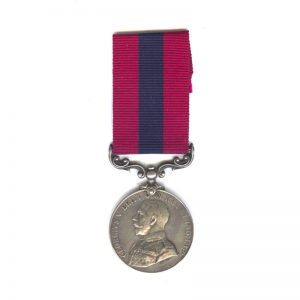Description
Distinguished Service Order, VR, Queen’s South Africa Medal, 6 bars, Relief of Kimberley, Paardeberg, Driefontein, Johannesburg, Diamond Hill, Wittebergen, King’s South Africa, 2 bars, SA 1901, SA 1902, Captain Edward Rex King, D.S.O. A.D.C. Brabants Horse and South African Constabulary.
Mentioned in Lord Robert’s Despatch, London Gazette, 16th April 1901
Awarded Distinguished Service Order, London Gazette, 19th April 1901 “In recognition of services during the recent operations in South Africa.”
Wounded in action at Heidelberg, 23rd June 1901.
In 1903 made Assistant Chief Secretary for Permits in Transvaal and became Aide de Camp to Lieutenant Governor the Hon Arthur Lawley, 6th Baron Wenlock, as he undertook the mammoth task of administrating the colony in the aftermath of the war requiring extensive reconstruction.
He was also Aide de Campe to the following Lieutenant Governor, Sir Richard Solomon, when Capt King fell ill and died at Potchefstroom of Enteric Fever during 1906, ending a most promising Career.
QSA, officially engraved in officer style: “Capt: E. R. King. D.S.O., Roberts Horse”
KSA, officially engraved in officer style: “Capt: E. R. King, D.S.O, S.A.C.”
Victorian Issue D.S.O. in silver gilt, as issued on silk ribbon with top bar brooch, only one slight flake to reverse top of left arm.
Both campaign medals virtually unworn as issued close to his early death.
Obituary in the Chard and Ilminster News, 23rd June 1906:
“Death of CAPT E. R. KING DSO ADC
The sad news was received on Thursday of the death of Capt. Edward Rex King, D.S.O., A.D.C., eldest son of Capt W. King, JP of Burridge, after a long illness of enteric in Potchestroom, South Africa.
The intelligence was received with profound grief by the relatives and many friends of the Distinguished officer, whose age was only 36, and it is needless to say the deepest sympathy is felt for Capt King and the family in their heavy sorrow.
It would be difficult to find a more popular gentleman than the late Capt King, nor one who gave greater promise of a distinguished career as an Officer of His Majesty’s Army.
The late Capt King was educated at Winchester, and upon leaving entered the 3rd Batt Royal Scots in 1887, and remained with his regiment until 1892. He then left England on an expedition to America, and returned home on the outbreak of the war in South Africa, when, with his brother, he volunteered for service, and enlisted in Robert’s Horse (1900).
In the same year he was given a commission, and a few months afterwards he was promoted to the rank of Captain. He distinguished himself throughout the campaign, but more particularly in the engagement at Sannah’s Post, in which he was twice wounded, and was afterwards awarded Distinguished Service Order.
He was twice mentioned in Lord Robert’s despatches, subsequently he served with the South African Constabulary, and was made Aide de Camp to Captain the Honourable Arthur Lawley, Lieutenant-Governor of the Transvaal, and upon the transfer of that distinguished officer to Madras, Capt King became A.D.C. to the present governor, the Hon. Sir Richard Soloman.
As an officer he was very much liked and very popular, whilst in addition he was a keen sportsman, making friends on all hands, and ever ready to act the part of a friend wherever it was needed.
It may be added that the late Capt. King’s Brother is Major of the Inniskillen Dragoons.”
Captain Edward Rex King, D.S.O., A.D.C,was born on 13th November 1869, the son of W. King, Justice of the Peace in Somerset, and Elizabeth, daughter of Dr Mules, of Ilminster, Somerset.
He was first educated at Winchester, followed by St Edward’s School from April 1800 to Midsummer, 1884, number 454.
Following him turning 18, he was gazetted to an Officer with the 3rd Battalion Royal Scots during 1887, he remained in the service until 1892.
After taking his discharge he went to America to undertake from business and was engaged in the lumber business and Ranching in Minnesota.
He returned to England around 1898 and then set off for South Africa during the Boer War to enlist himself for service, setting sail on 1st January 1900.
By 23rd January he had joined Roberts’ Horse, being commissioned on 2nd February 1900, only a few short months later he was promoted to the rank of Captain, as shown in the South Africa Army Orders of 18th January 1901, showing his promotion on 25th June 1900.
He was wounded in action at the Battle of Heidelberg on 23rd June 1900, The Colonials in South Africa, Roberts Horse, Page 165 speaks of the battle:
“In the next advance from Bloemfontein to Pretoria, the regiment was in the 5th Mounted Infantry Corps under Lieut.-Colonel Dawson, along with the 5th Mounted Infantry Regulars and Marshall’s Horse.
Frequently during the advance Roberts’ Horse was heavily engaged and suffered sharp losses. The regiment had sharp fighting near Heidelberg on the north side of the Vaal on 23rd June. The day was a disastrous one for the officers of the corps. Captain Whitaker was mortally wounded, Captain M. Browne and Lieutenants C.L. Learmonth and Rix King were wounded, while there were about 20 casualties in other ranks.”
A brief description of the battle from Ian Uys, ‘Heidelbergers of the Boer War’, Page 57:
“The British entered Heidelberg on the morning of the 23rd (1900), the cavalry from the north and the infantry from the east. The cavalry continued beyond the town to pursue the retreating Boers. Kpl John Spruit had anticipated this by setting an ambush, which included his pom pom gun.
Unknowingly Capt F.S. Whitaker led a detachment of Roberts’ Horse directly towards Spruit’s position. Spruit fired into the approaching horsemen at point-blank range.
The three officers leading the detachment were severely wounded.
Captain Whitaker was to die of his wounds the next day. The Boer Corporal kept the troopers pinned down
until British reinforcements arrived, then removed his gun and watched them head south for Villiers”
Award of the DSO, Chard and Ilminster News, 21st September 1901:
“D.S.O. FOR CAPTAIN E. R. KING – We are pleased to learn thatn Captain E.R. King, eldest son of Captain King, JP, of Burridge, has been awarded the Distinguished Service Order for his services in connection with the South African campaign. The Order was publicly presented to Captain King by the Duke of Cornwall and York at Pietermaritzburg.
Captain King formerly belonged to Roberts’s Horse, but now holds office in the South African Constabulary.”
His return home in the Chard and Ilminster Nes, 24th September 1904:
CHARDSTOCK, Captain E.R. King’s Return – On Saturday evening joyous peals were rung on the church bells as a welcome home to Captain E.R. King, A.D.C. to Sir Arthur Lawley, Governor of the Transvaal.
Captain E.R. King is the son of Captain King, of Burridge, and has now returned after an absence of nearly five years, during which time he served in South Africa.”

